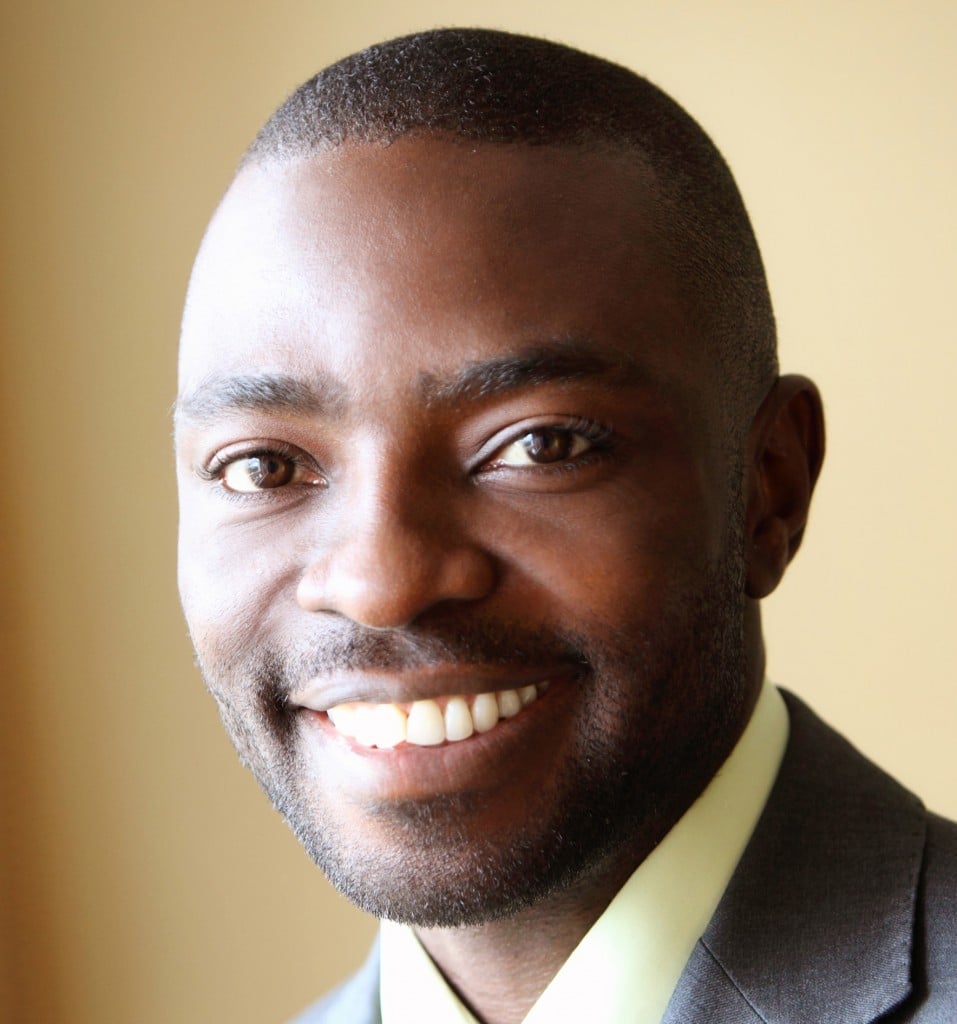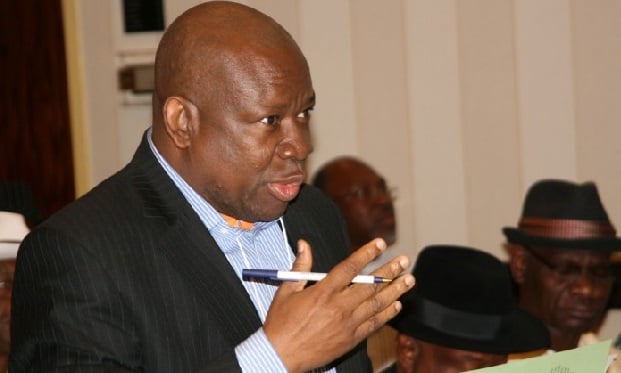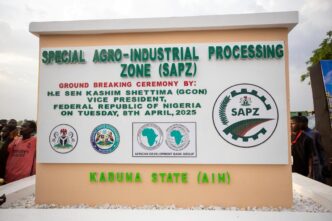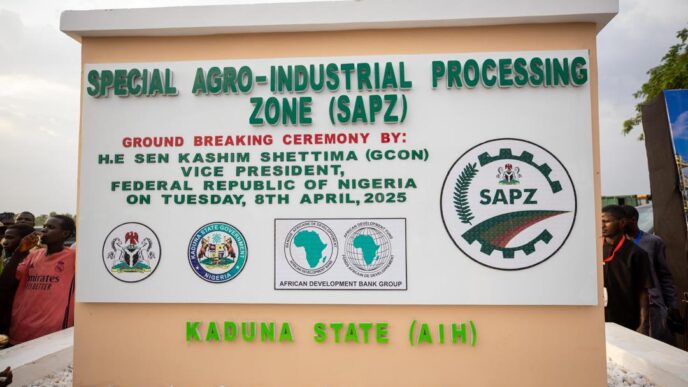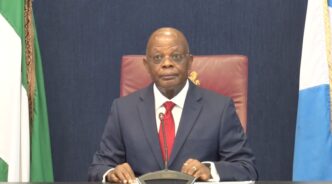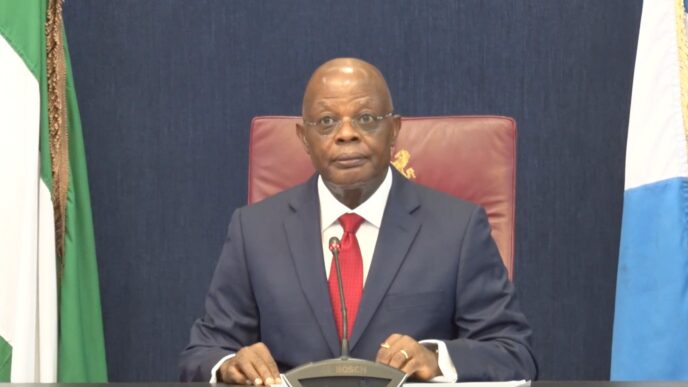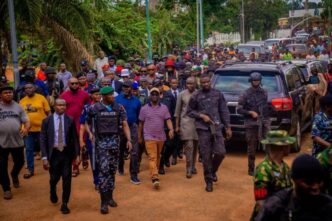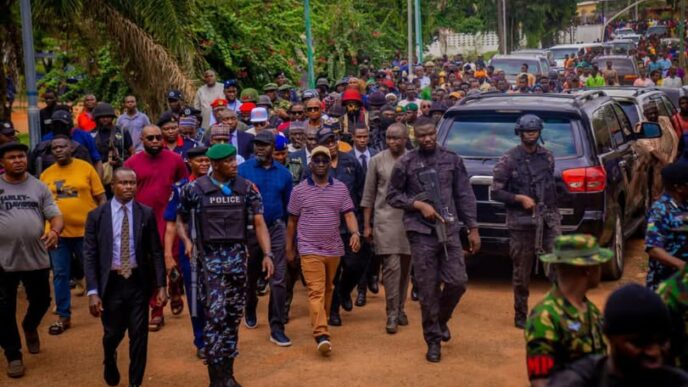“Lives of great men all remind us
We can make our lives sublime,
And, departing, leave behind us
Footprints on the sands of time”
Advertisement
– Henry Wadsworth Longfellow
April 9, 2025 makes it a decade when one of the most influential global thinkers, Oronto Natei Douglas, transited to ancestorhood. Reflecting on the life and times of Oronto, having spent close to two decades of my life with him, has since become a yearly natural occurrence since Oronto’s transition to eternal glory on April 9, 2015.
Each time I think about Oronto, fondly called OND by friends and acquittances, I do not only thank God for the privilege to have him as part of my life journey but wonder how he was able to make lasting impact and leave indelible footprints on the historical landscape of the globe. Determined not to turn to a wonderer in my wonder about the great fiats of OND, I purposed in my heart to inquire from him the secret behind his excellence and achievements.
Advertisement
A day came when the opportunity presented itself in one of our private meetings and I threw the question at him. “Chief Ipi, I do not really know. I am only trying to contribute my little quota to the advancement of humanity. In doing this, I try not to be distracted. The little impact we are making is by the help of God.” This was in the late 90s. OND then took me on a memorable lane of his humble beginning and how God has been faithful to him. It is a story for another day. Years later, I found out three underlying factors that made OND a trail blazer and the person he was. The God factor, finding his purpose early enough, and a focus in pursuit of his purpose.
By age, OND passed on at 48 years, but in these few years he transversed the planet earth, the seventh stanza of the famous Psalm of Life poem written by Henry Wadsworth Longfellow, best describes OND’s sojourn on earth. Oronto was a great man, and his life did remind us, especially those of us who were close to him, that we can make our lives sublime, and departing, leave behind us, footprints on the sands of time.
Oronto Natei Douglas was one of the Niger Delta’s most passionate voices. He was a lawyer, environmentalist, writer, policy adviser, etc. Oronto was not just a man of ideas, but of action. His life was a testament to purposeful advocacy, intellectual rigor, and selfless service to his people and country. A decade on, his absence is still felt deeply, yet his legacy continues to shape conversations on environmental justice, youth empowerment, and equitable development in Nigeria.
Champion of Communities and the Niger Delta Cause
Advertisement
Born in Okoroba-Ogbia, Bayelsa State, Oronto was intimately acquainted with the challenges of underdevelopment and environmental degradation that plagued the oil-rich but impoverished Niger Delta. His response was not one of apathy or bitterness, but of fierce intellectual resistance and strategic engagement.
As a co-founder of the Environmental Rights Action (ERA)/Friends of the Earth, Oronto was at the forefront of the struggle against environmental injustice in Nigeria. He documented oil spills, challenged multinational corporations inclusive of Shell, Agip, Chevron, Elf and amplified the voices of the marginalized communities of the Niger Delta.
He stood shoulder to shoulder in defence of Ken Saro-Wiwa in the campaign for Ogoni rights and was a critical part of the broader environmental and human rights movement in Nigeria.
Through meticulous research and fearless advocacy, Oronto helped elevate the conversation on the ecological cost of oil exploration in the Niger Delta to international platforms. His writings and presentations provided a roadmap for activists and policymakers alike, combining legal insight with emotional urgency.
Advertisement
In Oronto’s work to protect, defend, and promote the cause for a better Niger Delta and Nigeria, he suffered several abuses, especially from the Nigerian military. On the instructions of the late Lieutenant Colonel Paul Okuntimo, Oronto was beaten and flogged 100 strokes of the cane and kept under the rain in Bori Camp, Port Harcourt, for daring to visit Ken Saro Wiwa and other Ogoni detainees.
Vocal Voice in the Struggle for Democracy in Nigeria
Advertisement
Oronto’s activism was not limited to environmental issues. His involvement in the struggle for democracy in Nigeria and promotion of human rights remains a significant part of his enduring legacies. Oronto’s contributions were deeply rooted in a passionate commitment to justice, freedom of expression, and the defence of marginalized communities, particularly in the Niger Delta.
During the jack boot era and darkest periods of Nigeria’s military dictatorship, especially in the 1990s under the regime of General Sani Abacha, OND emerged as a strong voice. At great personal risk, he actively resisted the military’s suppression of civil liberties, advocating for a return to democratic governance. As a lawyer, he defended several pro-democracy activists who were arrested or imprisoned for opposing the regime.
Advertisement
Oronto was also a key member of the Civil Liberties Organization (CLO) and other prodemocracy groups. Through various platforms, he not only campaigned for environmental justice but also highlighted the link between environmental degradation in the Niger Delta and the broader political marginalization of his people.
He tirelessly documented and publicized the abuses faced by Niger Delta communities, linking them to the need for democratic reforms that would allow for local voices to be heard and respected. He authored and co-authored several reports and publications that exposed human rights abuses, environmental degradation, and the complicity of multinational oil companies in the repression of local communities. His writings became key references for local and international human rights organizations. Notable among these was his famous work with Dr Ike Okonta titled “Where Vultures Feast: Shell, Human Rights, and Oil in the Niger Delta”
Advertisement
Oronto laboured and suffered in his work of advocacy. He endured several arrests, detentions, and torture from the Nigerian Military dictators. Though he helped many Nigerian activists secure asylum in foreign countries, he chose to stay in Nigeria to join forces with other activists, regularly marching in the streets, demanding a return to democracy and respect for human rights. He never succumbed to military intimidations.
In his advocacy for justice, OND met with world leaders, including President Bill Clinton, and gave parliamentary briefings in foreign countries on issues of environmental rights, democracy and livelihood.
One of Oronto’s legacy remains that of a courageous patriot who believed and advocated for true democracy that must be rooted on justice, freedom of expression, equity, and the protection of human dignity. Today, people who knew next to nothing about the struggle for democracy in Nigeria now occupy political offices and messing up the system. May God have mercy on Nigeria.
Establishment of Niger Delta Development Commission NDDC
Many may not know the story behind the establishment the Niger Delta Development Commission (NDDC). Precisely on June 6, 1999, during his first tour of Rivers State, soon after his swearing-in, former President Olusegun Obasanjo GCFR, wrested a microphone publicly from OND at Government House Port Harcourt because Oronto dared to call attention to the injustice against the Niger Delta. While Oronto was still giving his speech on behalf of Ijaw Youths, calling the attention of the Nigerian government to the environmental degradation the region had suffered and demanding for self-determination, resource control and the abrogation of the Land Use Act which Obasanjo enacted as a military decree, President Obasanjo got visibly angry and stepped up suddenly and grasped the microphone from Oronto, in an attempt to forcefully take it from him. My heart raced. Never knew at such age and status, Obasanjo could not keep his emotions under check.
Unfortunately, Obasanjo didn’t succeed, and the situation resulted to both of them dragging the microphone on who would emerge victorious. Oronto told Obasanjo to wait for him to finish his speech, but Obasanjo refused. It took the intervention of prominent personalities in the hall to calm down the situation.
When Obasanjo took the microphone, he thundered. “What do you know about injustice? Have you been jailed unjustly before, like I have? Where were you when I liberated your fathers? If I did not sacrifice my life to defeat the Biafrans, where would you have been to be clamouring for resource control?” Obasanjo then berated the traditional rulers of the state for allowing Oronto to talk to him “like that”.
In the end, all parties left in anger and disappointment. However, Obasanjo received the message that the Niger Delta was not an area to be toyed with. Not too long after that encounter, Obasanjo announced the establishment of NDDC. Though previous leaderships of the NDDC could not deliver on the mandate of the commission, today, under the leadership of Dr Samuel Ogbuku, the commission has restored hope to the hapless people of the Niger Delta. It is worthy of note as well, that the Port Harcourt encounter was one of the factors that led Obasanjo to begin the implementation of the 13% oil derivation fund to the oil producing states in 2000.
Voice of Conscience at the National Political Reform Conference
The 2005 National Political Reform Conference (NPRC) was envisioned as a platform to address the many structural and political challenges facing Nigeria. Delegates from across the country gathered in Abuja to discuss constitutional reforms, federalism, resource control, and the future of the Nigerian federation. It was in this arena that Oronto Douglas distinguished himself – not just as a delegate, but as a principled defender of the Niger Delta and a moral voice in the national dialogue.
Representing Bayelsa State Government, Oronto brought to the conference the lived realities of the Niger Delta people. He was unapologetic in his demand for resource control, arguing that oil-producing communities had suffered decades of ecological degradation, economic marginalization, and infrastructural neglect, despite being the bedrock of Nigeria’s oil wealth.
He articulated the injustice of a system that allowed multinational corporations to extract resources while communities bore the brunt of pollution, poverty, and exclusion. His interventions at the NPRC were not mere speeches – they were moral indictments backed by data, lived experience, and legal insight. He became a rallying figure for minority voices at the conference, advocating passionately for a restructured Nigeria built on equity, true federalism, and environmental justice.
Oronto’s refusal to compromise on the principle of justice even led to moments of tension at the conference. He was among the voices that rejected any cosmetic reforms that ignored the foundational issues of resource ownership and self-determination. For him, any reform that didn’t address the root causes of Nigeria’s imbalance was simply an exercise in elite consensus-building without real transformative power.
Oronto demanded a 25% oil derivation for the Oil producing states. His demand led to serious tension in the conference where he mobilized a good section of the delegates and staged a walkout in protest of the federal government to stifle this noble demand. At the end of the conference, a recommendation of an increase in the oil derivation fund from 13% to 17% was made.
A Strategic Thinker in Government
Oronto made profound contributions to Nigeria during his service as Special Adviser to President Goodluck Jonathan on Research, Documentation, and Strategy. In this role, he brought his characteristic passion for justice, intellectual depth, and strategic thinking to the heart of Nigeria’s presidency.
I can attest that his time in office was marked by efforts to humanize governance, deepen democratic values, and preserve the nation’s historical memory. He was instrumental in developing people-centered policies and pushing for sustainable development initiatives in Nigeria. His commitment to transparency, accountability, and inclusive governance was unwavering, even within the complexities of national politics.
Oronto was instrumental in documenting the achievements and challenges of the Jonathan administration with a sense of transparency and historical awareness. He led a team that meticulously archived speeches, policy initiatives, development projects, and official engagements, ensuring that future generations would have access to a comprehensive record of the administration’s work. This effort was not just about legacy – it was about preserving institutional memory and learning. In this endeavour, Oronto’s Office published over 20 books and distributed them to all Federal Government Universities in Nigeria.
Though he held an official position, Oronto never lost his activist roots. He consistently advocated for the voices of the marginalized to be heard in national conversations. He facilitated town hall meetings, policy dialogues, and stakeholder engagements that gave civil society, youth groups, and community leaders a seat at the table in governance processes. One of such programmes was the launch of the Bring Back the Book Campaign, a programme that reached out to students in Secondary and Primary Schools across many cities in the country where books and other school supplies and study materials were distributed.
In his love for education and the intellectual power, Oronto built several libraries for public use across Southern Nigeria. What struck me most in this endeavour, was his conversion of the only building he owns in Yenagoa to a public library named in honour of Prof Ebiegberi Joe. Alagoa, a renown Niger Delta historian. What a commitment! He was deeply committed to youth development through education, and he mentored dozens of young Nigerians. Oronto believed in raising a new generation of principled leaders, and many of his mentees have continued to make positive impacts across different sectors.
In his work as Special Adviser, Oronto also supported the creative industry. He recognized the power of arts, literature, and culture in nation-building. He was a strong advocate for the Nigerian creative industry, working quietly to support writers, filmmakers, musicians, and artists. He believed that culture was both an economic force and a vehicle for social change. Through his support of writers, journalists, and cultural workers, he helped preserve the memory and dignity of the Jonathan’s administration. Under Oronto’s guidance, the Jonathan presidency became more engaged with the cultural sector, encouraging national storytelling and celebrating Nigerian talent.
Oronto was a special breed that belonged to its own class. As it is common in Nigeria, the usual behaviour of many, is to do a quick switch when in public office. This was not the case with Oronto. He continued to speak out for justice, fairness and equity. I witnessed several meetings where he consistently reminded government officials and policy makers of the numerous challenges in Nigeria and the urgent need for sustainable development. He used his access to the president to push for reforms and corporate accountability in all sectors of the economy.
As a strategist, Oronto played a vital role in shaping the public messaging of the Jonathan administration. He believed in using facts and storytelling to connect policies to the lives of everyday Nigerians. His approach was intellectual yet empathetic, and he ensured that communications from the president carried a tone of humility, service, and national unity. Not the “go and die” type that is common to many public office holders.
Legacy of Service and Integrity
Oronto Douglas was more than a public figure; he was a moral compass for many. His humility, simplicity, and refusal to compromise his principles made him an icon of integrity. In an era where many saw public office as a means of self-enrichment, Oronto remained steadfastly committed to the ideals of justice and equity.
I recall a case where one friend of his brought him a medium sized Ghana-must-go bag filled with Dollars to appreciate him for helping him secure a position in government. Oronto berated his friend and rejected the gift. In his words as I listened keenly from a nonvisible corner Oronto said “… you and I have known each other for several years. We have also work together in the trenches, weathering the turbulent storms of life, especially during the military era. I helped you not because I needed anything in return. Don’t do this next time. You are embarrassing me …”.
I also recalled that on several occasions, the multinationals have made series of unsuccessful attempts to bribe Oronto in cash and kind. One was through the offer of a scholarship award to Oronto’s younger brother (Gift Douglas), which Oronto vehemently rejected. His integrity is second to none.
The Need for the Federal Government and Niger Delta States to Honour and Immortalize Oronto Douglas – A Call to the Bayelsa State Government
Oronto Douglas was more than a public servant – he was a visionary, a patriot, a detribalized Nigerian and a tireless advocate for justice, environmental sustainability, and democratic governance in Nigeria. His legacy, etched in activism and public service, deserves national recognition and institutional remembrance. As such, it is both fitting and imperative that the Federal Government and the states in the Niger Delta, particularly Bayelsa State, take deliberate steps to honour and immortalize his contributions to Nigerian and the Niger Delta region. OND was:
1. A Voice for the Voiceless
Oronto spent his life amplifying the voices of the oppressed, particularly the people of the oil-rich but impoverished Niger Delta. He risked his life under military regimes, stood in defense of human rights, and used his legal expertise and global network to spotlight the injustices suffered by communities ravaged by environmental degradation and neglect. Immortalizing him is a way to ensure that the ideals he stood for – justice, equity, and environmental stewardship – are institutionalized and never forgotten.
2. Champion of Environmental Justice
As a co-founder of Environmental Rights Action (ERA) and one of the leading environmental justice campaigners in Africa, Oronto’s work significantly shaped environmental discourse in Nigeria. His relentless campaigns against oil pollution and corporate irresponsibility laid the groundwork for many of the ongoing debates on climate justice in the region. Establishing environmental research centers or green development initiatives in his name would be a tribute to this lifelong cause.
3. Pioneer in Documenting Governance
In his role as Special Adviser to President Goodluck Jonathan, Oronto was instrumental in preserving the administration’s legacy through meticulous research and documentation. He understood the power of narrative in governance and championed the use of historical records as tools for learning and accountability. Naming a national or state archive or documentation centre after him would be a profound recognition of this contribution.
4. Cultural Advocate and Youth Mentor
Oronto was a passionate believer in the power of culture, arts, and youth empowerment. He supported writers, filmmakers, and emerging leaders quietly but effectively. A centre for creative arts, leadership, or youth development bearing his name would inspire future generations to pursue excellence with integrity and empathy.
5. Bayelsa’s Son, Nigeria’s Gift
Born in Okoroba, Bayelsa State, Oronto Douglas exemplified the best of the Ijaw spirit – resilient, principled, and committed to justice. As his home state, Bayelsa has a moral responsibility to lead the way in celebrating his life and ideals. The state government can honour him by:
(i) Naming a public institution, such as a university faculty, civic centre, library or environmental institute, after him.
(ii) Instituting an annual Oronto Douglas Memorial Lecture to promote discourse on human rights, governance, and sustainability.
(iii) Developing a monument or museum in his hometown or Yenagoa to serve as a pilgrimage site for students, activists, and researchers.
(v) Fulfilling the pledge made by the Bayelsa State Government during the funeral of Oronto to award unconditional scholarship to his two sons to the highest level of education the children desire. This pledge remains unfulfilled till date.
Ten Years On
Ten years after Oronto’s passing, the Niger Delta and Nigeria as a whole continue to wrestle with the same issues Oronto fought against – environmental degradation, inequality, and political exclusion. Yet, his vision and values remain as relevant today as they were a decade ago. From youth-led environmental campaigns to advocacy for fair oil revenue distribution, his influence lives on in every effort to create a more just society.
We remember Oronto not with sadness alone, but with renewed commitment. His life reminds us that transformation begins with conscience and courage. As the Niger Delta navigates its path forward, let it be said that Oronto Douglas walked this land and left it better, braver, and more hopeful. Let the Governors of the oil producing states remember that the 13% oil derivation they are enjoying today, is the sweat and blood of Oronto Douglas.
In a time when many young Nigerians struggle to believe in the power of integrity and service, Oronto’s life offers a compelling counter-narrative. By immortalizing him, governments can present him as a role model – a man who rose from humble beginnings to national and international relevance without ever losing his humanity or betraying his people.
May the great, generous and humble soul of Oronto Natei Douglas continue to rest in peace eternal. Amen.
Okumo, an engineer, is the chairman of the Ogbia Brotherhood Unity Branch – Abuja & Northern Nigeria, and a member of the Ogbia Study Group. He worked with Oronto Douglas for about two decades.
Views expressed by contributors are strictly personal and not of TheCable.
